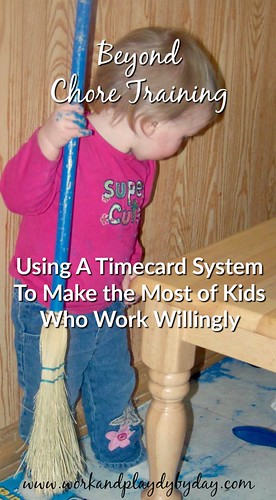Chores posts are always popular in this space …. and as a busy mom of many, I do not struggle at all to understand why!
My first line of chore defense is always to teach them properly and consistently from the very beginning. I wrote that out in eleven more specific steps, here. I don’t, ok I try not to, pester too much and I don’t offer rewards for getting the basics done. Some things in life have to be done, no matter how unpleasant they are.
That being said, even as a stay at home mom, I have opportunities to go above and beyond my regular vocational duties and earn some extra money. Since we don’t pay our children an allowance, we give them the opportunity to earn pocket money using a timecard system.
At our house, Kids who are finished with their basic responsibilities (always first, based on our weekly/daily cleaning lists) are able to do above-and-beyond jobs for a little extra spending money (or saving or giving, but that’s another post). Jobs are available by request or posted on our kitchen whiteboard. Some jobs, such as weeding a section of garden bed, are always available.
When they complete a job, they fill it in the timecard on their clipboard and bring it to me for a job-check and my initials. They don’t get initialed until I’ve had a chance to check that the job is finished to a pay-worthy level. No timecard or no initials, no pay.
I call this natural-consequences life training.
Every two weeks when Tim gets paid, I collect the cards and clip the cash they earn to their clipboard. Other than initialing and actually passing out money, this is a very low mom-involvement system. I like that kind, don’t you?
The most common trap I fall into is to start feeling like it is required. In order to use a timecard system effectively, my kids have to think that I don’t care if they don’t earn any money. Which is funny, because when I put it that way I shouldn’t care! Cheaper for me, right?! It’s easy, however, to start relying on the extra help and find it inconvenient when they decide they have enough for right now.
The best fix I’ve found is to give them a heads up when we are getting close to optional jobs moving into required jobs. For example, we are hosting an event and the house and yard both need to be in tip-top shape before the weekend. Early in the week I will make a list of pay jobs and their corresponding rates (for simplicity, almost everything at our house is worth $1). I let them know that these are the things that we will need to do by Saturday (or whatever day) and then I shut my mouth for a couple days.
The day or two before, the jobs are removed from pay opportunities and become everyone-pitch-in-to-get-ready jobs. Not optional. Not paid. Sometimes most of the jobs are done before this point, sometimes none of them are. I don’t have to make a big deal of it and they are left with nothing to whine about (which isn’t to say they don’t try) because they were given the chance to do it for pay, knowing that eventually it needed to be done either way.
I haven’t needed to cap the amount of money one child can earn. They each seem to have their own ebb and flow of extra work and that’s ok. I want this to be something they choose. If you have a particularly entrepreneurial child, however, you may have to set a cap based on what you are willing or able to provide. Be sure to consider your own budget in both the use of a cap and the value level you set for each job.
Finally, be sure to consider the age and abilities of your children in designing the specifics of your family system. Maturity matters. At our house, we have determined that you have to be old enough to fill out the timecard alone to earn pay jobs. We set it this way partially as an extra motivator for our non-readers and partially based on the development of the child him/herself.
This is only a win-win scenario for everyone if the child is willing and able to complete jobs independently. Not only the pay jobs, but more importantly their individual daily responsibilities. Don’t create a system that requires you to lower your standards for some kids or leaves kids rushing through the basics to get to the pay. Create a system that provides a built in incentive for completing work properly and responsibly from the very beginning. If mom or dad have to go back and “fix” the weeding of the six year old, then it becomes a lose-lose instead of a win-win! Seriously, don’t pay your kids for jobs they don’t do properly ….. maybe this sounds mean and terrible, but its life and it will pay back double for your kids’ work ethic in the long run. The six year old also doesn’t have much need for the spending money of his/her older siblings anyway, no matter how much they might want it.
Ready to jump in and try a timecard system? Subscribe to our newsletter and gain access to the subscriber-only freebie section. There you will find an ever growing list of Montessori, parenting, and homemaking resources just for subscribers, including a printable timecard you can use to implement your own system! This post has been linked to Montessori Monday at Living Montessori Now.


Recent Comments